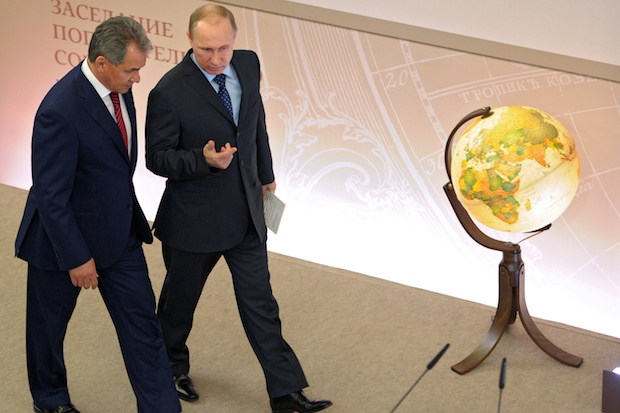Possibly because his oratory is no match for his much-displayed pectoral muscles, the speeches of Vladimir Putin are seldom reported at length in the West. But as a means of understanding the manoeuvres in eastern Ukraine this week, there is no better starting point than the speech he made to the Duma when the Russian parliament annexed Crimea. Lest anyone thinks his words have been enriched by an over-imaginative reporter, the translation is provided by the Kremlin itself.
Speaking of the break-up of the Soviet Union in 1991, he asserted, ‘Russia realised that it was not simply robbed, it was plundered… Millions of people went to bed in one country and awoke in different ones, overnight becoming ethnic minorities in former Union republics, while the Russian nation became one of the biggest, if not the biggest, ethnic group in the world to be divided by borders.’ At the time, Russia ‘humbly accepted the situation’ because it was going through such hard times then that ‘realistically it was incapable of protecting its interests’.
Putin believes that times have changed. Russia is more minded to protect its interests — and, as he has found, the same is not quite so true for the West. The Kremlin feels that now is the time to test new boundaries. Crimea is really just the beginning of a campaign, under the cover of the UN’s right to national self-determination, to reassemble the Russian empire. For anyone hoping he might stop with eastern Ukraine, he helpfully described Kiev as the ‘mother of Russian cities’.
You do not need to be an anthropologist to work out that once you start justifying helping yourself to regions of other nation states by reference to the presence of ethnic Russians, there are other possibilities, too: Kazakhstan, Kyrgyzstan, Tajikistan, Turkmenistan and Uzbekistan all have significant Russian populations. And what about Belarus? Or the Baltic states? Putin talks now as if he is ready to avenge two decades of western dominance and our definition of national self-determination.
His speech was as cogent as it was menacing. He had words for the West. ‘If you compress the spring all the way to its limit, it will snap back hard — you must always remember this.’ And when soldiers in unmarked uniforms start to seize police stations in eastern Ukraine, he shows us precisely what he means.
To understand this new resurgent Russia, it is important to work out the ways in which Putin is right. The Kremlin has a sense of purpose and direction in its foreign policy — the West lacks both. Putin has detected this and sensed that now, with a war-weary West, is the ideal moment to act to reverse what he regards as the tragedy of the break-up of the Russian empire. When he moved in Crimea, and this week in eastern Ukraine, he knew he could bank on a short-term and not-entirely-strategic response from the West. A visit from Vice-President Joe Biden was the most threatening gesture America would make.
So long as Putin is not so crass as to send tanks rolling across borders, and wraps up everything he does in the language of human rights and national self-determination, he can get away with pretty much anything. No matter what Russia does next, we need not concern ourselves too much with the sounds coming out of Westminster or Capitol Hill. The script has already been written. Putin will try his luck further, the West will declare itself jolly cross, and Putin will ask if the West has a right to preach about not invading foreign countries when it has sent in the tanks to Iraq and Afghanistan. It was once the Soviet Union which revealed its soft underbelly through military failure in Afghanistan; now it is us.
How quickly we forget that our best weapon in the Cold War was a clear sense of purpose — an ability to articulate the set of values that we were defending. It was this that enabled Eastern European countries to join the comity of free nations. But as Putin likes to point out, the West’s fantasy of acting as world policeman — striking out dictators and returning countries to democracy — is finished. What should now take its place? The Kremlin is making its vision perfectly clear. It’s time the West did the same.






Comments